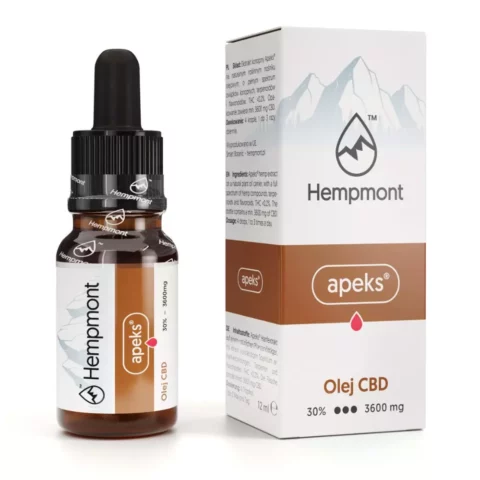
- 28 March 2022
- 3 komentarzy
- 7 views
Oil CBD is a whole spectrum of beneficial effects on the body. This includes the realm of sleep. But is cannabidiol a kind of sleeping pill? No, it does not work like that. But can it assist those suffering from insomnia, sleep nightmares, problems falling asleep, crashing upon waking and other sleep disorders? As much as possible. Is CBD oil for sleep safe and effective? The research results say yes, and it is sleep that is currently the best studied aspect of cannabidiol's effects in the world.
This is why it is worth trying CBD oil for sleep when you need to cope with sleep nightmares, with the regulation of sleep phases and when, upon waking up, instead of being compact and ready to face new challenges, you are broken down, tired, stressed and without the will to act.
What is CBD?
CBD is otherwise known as cannabidiol, an organic compound found in hemp. After THC, it is the second best studied cannabinoid, of which 113 have already been identified in cannabis.
However, CBD, unlike THC, does not exhibit any psychoactive properties as it does not stimulate CB1 cannabinoid receptors in the brain. Instead, cannabidiol (CBD) acts as a modulator of CB1 and CB2 receptors, thus supporting the endocannabinoid systemwhich, among other systems, is found in the human body. This system is responsible for keeping the body in balance (homeostasis), being responsible for a whole host of neurobiological processes in the body. It regulates, for example, body temperature, memory, appetite/craving, fertility, immune function, reactions to fear and stress stimuli, mood and regulation of the sleep-wake cycle.
The endocannabinoid system produces endocannabinoids, the counterparts of which are cannabis-derived phytocannabinoids. If health begins to deteriorate, this system can no longer keep up with the production of endocannabinoids, and can no longer keep alive the ones it has already produced. And this is the moment when CBD can step in.
Sleep disorders
Sleep problems occur when we either cannot fall asleep or wake up during the night for various reasons. When sleep problems persist over a period of time it is then said to be a sleep disorder. Constant sleep deprivation eventually leads to the onset of various illnesses.
Sleep disorders usually occur for several reasons, it could be a life of constant stress, poor eating habits or various medical conditions that make it difficult to fall asleep. They can be caused by excessive stimuli provided to the body, such as watching TV until late, computer games, late workouts. It can be caffeine abuse or so-called overstimulation of the body caused, for example, by anxiety, living under stress, pain or side effects of medication.
If the body is not getting enough sleep, this results in symptoms such as constant yawning, lowered mood, fatigue, lack of productivity, memory problems, impulsiveness, problems concentrating, constant irritability or a foggy mind. Sometimes these symptoms can even lead to depressive disorders.
The most common forms of sleep disorders include insomnia, snoring and sleep apnoea.
If ongoing sleep disorders are left untreated, the consequences are really serious. Over time, immunity is weakened, the risk of hypertension increases, libido weakens, weight gain occurs, there is an increased risk of diabetes or heart disease. Another consequence can be the development of anxiety and even depression.
How to deal with sleep disorders
- Evening chasing thoughts, stress and anxiety - These are the most common causes that prevent people from falling asleep. Mostly, they imply problems with the nervous system. Thanks to the fact that CBD affects the neurotransmitter GABA, by modulating its receptors it triggers it. GABA is a brake of sorts that holds back an overstimulated nervous system. This can have the effect of not only calming chasing thoughts, which will translate into the ability to fall asleep, but also assist in dealing with stress or lack of concentration.
- Sleeping problems - When studying the effects of higher doses of CBD oil on the body, it has been noted that people then begin to experience increased sleepiness. The reason for this is that blood pressure is lowered, causing breathing to calm down and the body to be ready to fall asleep. Therefore, if an increased dose of CBD oil is applied one hour before bedtime, it gives the body time to calm down and allows it to enter the first phase of sleep more quickly.
- REM phase disorders - When we are in a disturbed REM phase of sleep, uncontrolled movements, vocalisations or other reactions often occur, causing awakening. Taking CBD, presumably by keeping the body longer in the deep sleep phase, eliminates these side 'attractions' of the REM phase.
- Chronic pain - Pain, whether it is the result of an injury, inflammation, illness or training, always causes a deterioration in the quality of sleep or sometimes even insomnia. Because CBD already has really well-documented analgesic and anti-inflammatory effects, it is able to address these causes of insomnia.
- "Selected issues from sleep medicine" MICHAŁ SKALSKI; Department of Psychiatry, Warsaw Medical University;
- "Reasons for cannabidiol use: a cross-sectional study of CBD users focusing on self-reported stress, anxiety and sleep problems"; Julie Moltke & Chandni Hindocha; 2021; https://jcannabisresearch.biomedcentral.com/articles/10.1186/s42238-021-00061-5
- "Effects of acute systemic administration of cannabidiol on sleep-wake cycle in rats"; Marcos Hortes N Chagas , José Alexandre S Crippa , Antonio Waldo Zuardi et al; 2013; https://journals.sagepub.com/doi/abs/10.1177/0269881112474524
- "Translational study of the therapeutic potential of cannabidiol (CBD): towards a new era"; José A. Crippa, Francisco S. Guimarães, Alline C. Campos and Antonio W. Zuardi; https://www.ncbi.nlm.nih.gov/pmc/articles/PMC6161644/
- "Efficacy of cannabidiol oil in the treatment of anxiety and insomnia in children as part of post-traumatic stress disorder: a case report"; Scott Shannon, MD, ABIHM, Assistant Clinical Professor of Psychiatry at the University of Colorado School of Medicine in Fort Collins; https://www.ncbi.nlm.nih.gov/pmc/articles/PMC5101100/.
- "CANNABIDIOL (CBD) Critical Review Report"; Expert Committee on Drug Dependence Fortieth Meeting; Geneva, 4-7 June 2018; World Health Organization.










Jadwiga B.
Firstly:
- After this oil, sleep is, above all, deeper and more restorative, and consequently I get better sleep
Secondly:
- I am not stupefied and I get up really well rested unlike the pharmacy drugs I used to use and get up in a worse state than before taking the tablet
Thirdly:
- I am less nervous
I take 3 times a day, but a higher dose in the evening. I have been using for over six months.
Gosia
I use 10% oil from hempmont and have seen results after the first doses, to my great surprise! I take 4-5 drops for sleep, and recently I have also been taking it in the morning for calmness and I am satisfied. I sleep much better.
Marianna Opolska
Great, it works for me. I sleep like a slayer and the neurotic complaints have become a little more mild. My dose is 45 mg a day (3 drops). The taste is also quite okay, it's worth drinking water in the evening, otherwise you can wake up with a bitter aftertaste on your tongue.